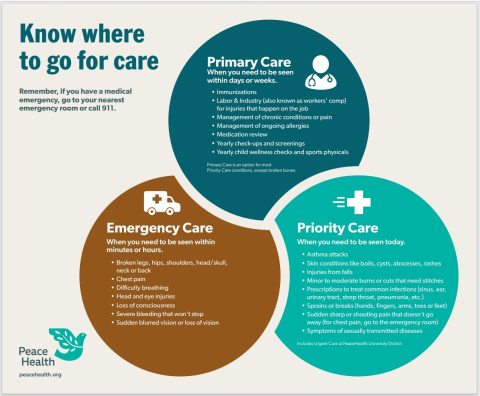When to go to the ER vs. Urgent Care
| Healthy You | Safety | Wellness

Here’s a guide for matching your needs to a clinic or hospital.
If you or a family member is sick or injured, going to the right place for the right care can help you feel better faster. But how do you decide where to go?
"Your primary care provider (PCP) can take care of most of your health needs through regular check-ups or same-day visits," says Simon Lai, MD. "If you need a higher level of care right away, that’s when to consider emergency care."
Where you choose to go also depends on who needs care. Is the person you’re taking to the visit a newborn with a high fever or an 85-year-old with a heart condition?
"If you can, talk with your PCP or pediatrician about what to do in urgent situations for people with special needs," notes Dr. Lai. Another option is to call your regular provider’s office and ask to talk to a triage nurse for advice.
Here’s a general guide for finding the service that best suits your needs:
Priority Care — for illnesses and injuries that aren’t life-threatening
If you need to be seen outside of your PCP’s office hours, consider a clinic that has same-day, drop-in or urgent care.
These clinics, called Priority Care, same-day or urgent care, offer many of the same services as primary care clinics. They are often open evenings, weekends and holidays. You may be able to drop in without an appointment, or you can book your visit ahead of time.
All locations include X-ray, lab and other services that help doctors diagnose and treat injuries or illnesses.
Immediate care is best for things that need to be seen within days. Think of things that won't get better on their own and that may get worse if left untreated. This includes:
- Asthma attacks
- Boils, cysts, abscesses, rashes and other skin conditions
- Injuries from falls
- Minor to moderate burns or cuts that need stitches
- Prescriptions to treat common infections (sinus, ear, urinary tract, strep throat, pneumonia, etc.)
- Sprains or breaks of hands, fingers, arms, toes or feet
- Sudden sharp or shooting pain that doesn’t go away (if you’re having chest pain, go to the emergency room)
- Symptoms of sexually transmitted infections
These are just a few examples of what you can be seen for at a clinic that offers immediate care. As with PCP visits, these types of clinics cost less than going to the ER.
Learn more about Priority Care
Emergency care — for conditions that may lead to a loss of life or limb
For serious illnesses or injuries, go to the nearest emergency room or call 911.
The ER is the right place for conditions that need treatment or test results, scans and X-rays right away.
ERs see patients according to how severe their conditions are. Keep in mind that if someone with a more serious or life-threatening condition arrives after you, they may see the doctor sooner.
Call 911 or go to the ER for things that should be seen within minutes or hours. This includes:
- Broken legs, hips, shoulders, head/skull, neck or back
- Chest pain
- Difficulty breathing
- Head and eye injuries
- Passing out
- Severe bleeding that won’t stop
- Sudden blurred vision or loss of vision
Emergency care usually costs more than other kinds of care. But it can mean saving a life or having the chance for full recovery.
When in doubt, don't put off care. If someone is having an emergency, call 911 or get medical help right away.
Primary care — for conditions that need preventive or ongoing care and are not life-threatening
In general, if you have a primary care provider, think of your PCP first. The only time this doesn’t apply is if your illness or injury is life-threatening. Then call 911 or go to the hospital near you.
Seek care from your primary care provider for things that need to be seen within weeks, such as:
- Immunizations
- Labor & Industry (also known as workers’ comp) for injuries that happen on the job
- Management of chronic conditions or pain
- Management of ongoing allergies
- Medication review
- Yearly check-ups and screenings
- Yearly child wellness checks and sports physicals
These are just a few of the concerns that can be treated at a primary care clinic.
Why primary care first? Because your primary care provider’s office knows you and your health history. They handle a wide variety of concerns. And for services they don’t offer, they’ll help you find other doctors or places that provide what you need. They also may help smooth the way for you to be seen sooner. And it usually costs less to see a PCP than to go to an emergency room.
You can call your PCP’s office to make an appointment. You might also be able to book an appointment online through our patient portal, My PeaceHealth. You can also use the portal to send messages to your doctor, view test results and review instructions or notes from past visits, among other things.







